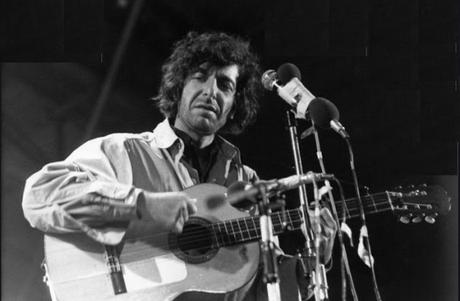Earlier this year, February 23rd actually, was the 200th anniversary of the passing of one of England's finest 'romantic' poets, John Keats. He died aged just twenty-five in Rome, of tuberculosis, and was buried in that city's Protestant cemetery. At the turn of the year, in anticipation of that impending anniversary, the Poetry Society challenged its members to write something relevant to the occasion and the poet. I had every good intention of doing so, of writing an ode in the style of Keats.Many is the time I've drunk in The Spaniards pub in Hampstead, have sat in its beer garden, where Keats is supposed to have listened to that nightingale and composed his famous ode. As January rolled into February, I had the concept all lined up... but I never quite got the poem down: lifeline busy, deadline missed.
Never mind, I'm looking to put all of that right in this week's blog about lifelines & deadlines as they pertained to one of my favorite contemporary musicians and poets, international man of misery Leonard Norman Cohen.

Lugubrious Lenny (1934-2016)
I've enjoyed Cohen's poetry and music since the late 1960s, as I'm sure many of you have done, but it's only been in the last year or so that I've delved in any detail into his life story. I posted a blog recently about bohemian creatives on the Greek island of Hydra in the early 1960s. Cohen was one of them and you can link to that blog here if you missed it: ColoniesCohen's time on Hydra was transformational. He arrived from the cold of Montreal as a published poet ('Let Us Compare Mythologies'), seeking sun and the inspiration to write more poetry and novels. Much of the poetry in 'The Spice-Box Of Earth' and 'Flowers For Hitler' was written on or inspired by Hydra as was his first novel 'The Favourite Game'. It was fortunate for him that living on a Greek island was relatively inexpensive, for Leonard soon discovered that there was not much money to be made from writing poetry or avant-garde novels. Luckily, he'd taken a battered old guitar along with him and for many a night in the early 1960s he would lead the coterie of impoverished writers, painters, their guests and some friendly locals in sing-songs at some quayside taverna or other. Initially the repertoire was old English or American folk standards but as the decade progressed Cohen began to write original material and though he never had much confidence in his singing voice, he was encouraged by the praises of his Hydra cohort.
Matters came to a head in 1966 when he was on an extended visit to the USA. He was broke, his second novel 'Beautiful Losers' had failed to reverse his fortunes and he was persuaded by the movers and shakers of the New York folk scene that he should try out as a folk singer. He even toyed with the idea of moving to Nashville; but then Judy Collins recorded a couple of his compositions, 'Suzanne' and 'Dress Rehearsal Rag' on her 1966 LP 'In My Life' (yes, the Beatles' song) and Cohen's lifeline changed dramatically from that point. Producer John Hammond heard a demo tape of Cohen's songs, CBS Records signed the Canadian as their latest singer-songwriter sensation and soon Leonard was being feted by the scene, was appearing at festivals, recording his debut LP, numbering Janis Joplin and Joni Mitchell among his paramours.
'Songs From A Room' (many of them originally conceived on Hydra) cemented the reputation established by his eponymous debut and for a couple of years Cohen's lifeline was swept along by the music industry machine, a schedule of touring, song-writing, recording, being idolised by thousands all wanting a bit of him.
By the early 1970s he'd certainly tapped into the exposure and financial rewards that had been out of reach of the poet and novelist, but such success came at considerable personal cost - deadlines, demands, disorientation, so much so that by 1971 he was describing himself as "a broken-down nightingale". When I read that statement in one of his biographies, I knew what my Keats-inspired narrative poem was going to be about: a reimagining of that night in the middle of an exacting and crazed European tour when lugubrious Lenny (or Captain Mandrax as he was known) nearly went over the edge into the abyss.

A clockwork Nightingale
I'm not a big fan of the constraints of versification and metre, but this is one instance in which I felt obliged to adhere to the structures of rhyme-scheme (ababcdecde ) and iambic pentamers (with a trimeter inserted at each eighth line) as employed by Keats in his original Ode To A Nightingale. I have also, for obvious reasons, changed the narrative perspective from first person and set a limit of five on the number of stanzas, as compared to the original eight. I'm happy I've done the form justice. It's for you to judge the merit of the content and its overall effect. Here we go then, on the wings of Poesy... Ode To A Broken Down NightingaleYour throat aches and a numbness dulls your hand, So though the plaudits ring around the hall,You dose on mandrax washed with wine and stand Your ground, refuse to take the curtain call.Though some might envy you your role tonight, Another foreign town with plush hotel,A line of girls who queue to share your bed, None of this feels quite right.The goddess Fame span a beguiling spell But you have come to view her hold with dread.Now far away and almost quite forgot, That simpler time upon a Grecian isleWhen life was sweet and Poesy was your lot With Marianne your Nordic muse, whose smileUnlocked the spice-box for you, and who placed A fresh gardenia on your desk each day,All distractions kept at bay except one; Warm evenings when you gracedThe harbor cafes, happy just to play And sing for those bohemian friends - all gone.
In Berlin or in Rome your body fits To simulate the lover and the seerWhose words have filled some million bedsits, Whose intimate confessions forced a tearIn corners where your lonely listeners dwell. They paid their pound and now they want the flesh.Our recording angel's testimony States you fake the part well,Can rail like a bird that's caught in a mesh, Such anguish revealed, nothing sounds phoney.
And yet the mirror doesn't lie. Dark pools Reflect a deeper truth, the death of hopeAs, burdened by the weight of trusting fools, You fantasize of reaching for the rope.One knot, one drop might free you from this trap, To fly into the dark beyond at lastWith weary mechanism jettisoned. Is this the final lap?Your dress-rehearsal rag audition passed? The executioner stares, reticent.
Lore of your fathers makes you turn away, Pull on the famous raincoat, collar up,And slip discreetly the post-concert fray Through damp September streets, your bitter cupBrimming with furious pity for yourself And for a world gone wrong, where every songBeats wings against the urgings of your heart, Each show erodes your health.You make the choice once more not to belong, Outsider, now your future may restart.
Just for those of you who don't know the back story, Cohen could easily have died an early death, like Keats, but he decided to walk away from the scene, to escape from what he called "captivity in the tower of song" and he joined an order of Buddhist monks. Only decades later, when he discovered that his manager had swindled him out of his funds, did he make a belated return to the circus of the music world, to pay for his retirement years. In his sixties and seventies he wrote, recorded and played concerts once more, to great acclaim, only this time on his own terms and not anybody else's. Respect to the man.
Thanks for reading. Tonight will be fine.....for a while. S ;-) Email ThisBlogThis!Share to TwitterShare to Facebook
